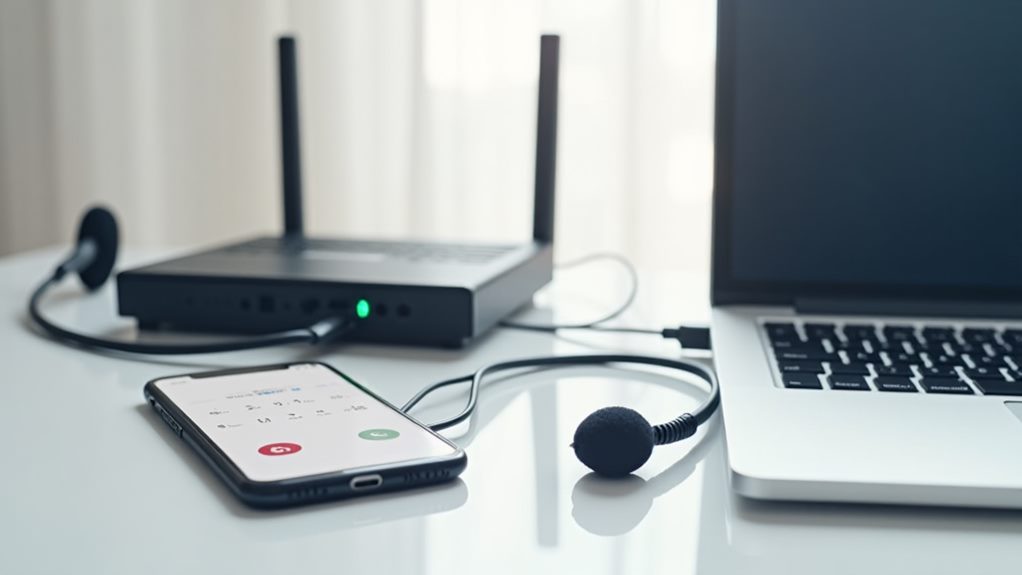Yes, you can get free VoIP services through providers like Google Voice, TextNow, and Skype that offer basic calling and texting features over internet connections. These services work through smartphone apps or computer software and typically include functions like voicemail, local area codes, and spam blocking. While free VoIP options can save you money, they come with notable limitations such as ad interruptions, potential audio quality issues, and restricted features. You’ll need a stable internet connection and compatible device to use these services. Understanding the trade-offs between free and paid VoIP solutions will help you make the best choice for your communication needs.
Understanding Free VoIP Services

Free VoIP (Voice over Internet Protocol) services offer a cost-effective communication solution that leverages your internet connection to make calls and send texts. When you’re exploring free VoIP options, you’ll find popular choices like Google Voice and TextNow that provide unlimited calls and texts within the U.S. and Canada, making them particularly valuable for small businesses and freelancers.
Many of these services, such as Google Voice, are known for their local area code options and additional features like voicemail transcription.
As you join the growing community of VoIP users, you’ll discover that these free VoIP services primarily operate through smartphone apps. While you’ll be able to make and receive calls without spending money, you’ll need to take into account that free plans often include advertisements.
The call quality of free VoIP phone systems depends largely on your internet connection stability, which can affect your communication experience.
Before committing to a free plan, you should understand that these services come with certain trade-offs. While you’ll enjoy basic features at no cost, you won’t have access to advanced business tools or premium security features that paid versions offer.
Additionally, you’ll typically receive limited customer support compared to paid alternatives, but the cost savings can make these limitations worthwhile for many users.
Top Free VoIP Providers
Several established VoIP providers stand out in the market for their reliable free service offerings. Google Voice leads with its all-encompassing VoIP system, offering free calls, texts, and valuable features like voicemail transcription and spam blocking. You’ll need to maintain regular activity to keep your number active.
In addition, top free VoIP services like Skype, WhatsApp, and Viber provide secure communication options that cater to both personal and professional needs.
TextNow delivers unlimited calls and texts across both WiFi and cellular networks. While it includes ads, you can remove them for $9.99 monthly. For Android users, 2ndLine serves as an efficient secondary phone line with unlimited calls to both U.S. and Canada, though you’ll need to use it consistently to maintain service.
If you’re looking for a business VoIP provider that’s free, Zoom offers video calls for up to 100 participants with a 40-minute limitation on meetings.
WhatsApp stands out among free VoIP phone services, providing unlimited calls, texts, and video calls through VoIP technology. However, both parties must have the app installed, and you won’t receive a dedicated phone number.
Each of these options offers distinct advantages for different user needs, whether you’re seeking a business solution or personal communication tool.
Limitations of Free VoIP

When you opt for free VoIP services, you’ll face significant feature restrictions, including limited storage for voicemails, basic call functionality, and the absence of advanced options like call forwarding or conference calls.
These limitations can hinder effective teamwork and productivity, as enhanced mobility and seamless connectivity are often critical for modern communication.
Your calls may suffer from inconsistent audio quality and connection stability due to network prioritization favoring paid users.
These network-related challenges, combined with feature limitations, can impact your communication reliability and operational efficiency, especially in professional contexts.
Common Feature Restrictions
Using VoIP services at no cost comes with notable functional limitations that users must consider before implementation. When you opt for free VoIP providers, you’ll encounter restricted features that can greatly impact your communication capabilities.
Call quality varies based on your internet connection, and you’ll need to manage inconsistent performance without dedicated customer support, leaving you to resolve issues through community forums.
You’ll find that common feature restrictions extend beyond basic calling functions. While you can make domestic calls, services typically limit access to premium features like voicemail transcription, call forwarding, and international calling unless you upgrade to paid tiers.
Additionally, you’ll have to contend with advertisements during calls, which interrupt conversations and affect the overall user experience. Some providers require you to maintain active usage to retain your phone number, meaning you risk losing your assigned number if you don’t regularly use the service.
To maximize your free VoIP experience, you’ll need to carefully evaluate which limitations you can work around and which might necessitate upgrading to a paid service for your specific communication needs.
Network Quality Concerns
Network quality stands as the primary technical challenge when implementing free VoIP solutions. When you’re using free VoIP services, you’ll likely encounter performance issues that directly correlate with your internet connection’s stability.
You’ll notice symptoms like dropped calls, voice echoes, and delayed responses during conversations, which can greatly impact your communication effectiveness.
Your experience with free VoIP services that rely on cellular networks, such as TextNow and 2ndLine, may be particularly frustrating in areas with poor reception. These services often struggle to maintain consistent call quality, and you’ll find yourself dealing with intermittent connectivity challenges.
The situation becomes more complex when you factor in advertisement interruptions that can disrupt your calls unexpectedly.
You’ll also face limitations in technical support resources. Without dedicated customer support, resolving network quality issues becomes your responsibility.
The restricted feature set of free VoIP platforms further compounds these challenges, as you won’t have access to advanced functions like call forwarding that could help mitigate connection problems.
When network issues arise, you’ll need to troubleshoot independently or seek community forums for solutions.
Security and Privacy Concerns
When you’re using free VoIP services, you’ll face significant security vulnerabilities due to inadequate data encryption methods and potential network breaches that can expose your communications.
Your identity and personal information are particularly at risk since many free VoIP providers don’t implement robust protection measures against eavesdropping, data theft, or unauthorized access.
To safeguard your privacy, you’ll need to carefully evaluate a service’s encryption protocols, network security infrastructure, and data handling policies before committing to its use.
Data Encryption Methods
Security protocols form the backbone of VoIP data protection, with encryption methods playing an essential role in safeguarding your voice communications. When you’re selecting a VoIP service, you’ll want to guarantee it implements robust encryption protocols like SRTP and TLS to secure voice data transmission against potential threats.
End-to-end encryption serves as your first line of defense, guaranteeing that only you and your intended recipient can access call content. This protection is critical in preventing unauthorized access and potential cyberattacks that could compromise your sensitive communications.
While free VoIP services might seem attractive, they often lack extensive encryption methods, leaving you vulnerable to voice phishing and data breaches.
To protect yourself, you’ll need to carefully evaluate VoIP providers based on their security practices. Look for services that transparently detail their encryption methods and regularly update their security measures.
You’re part of a community that values privacy, so prioritize providers that maintain rigorous security standards and perform consistent security assessments. By choosing a service with strong encryption protocols, you’re investing in your communication security and joining others who take their digital privacy seriously.
VoIP Network Vulnerabilities
Building on encryption protocols, VoIP networks face multiple vulnerabilities that require systematic attention. When you’re using free VoIP applications, you need to understand several essential security threats that could impact your communications.
Eavesdropping poses a significant risk, as unauthorized parties can intercept your calls if proper encryption isn’t in place. Your privacy concerns extend beyond call interception. Free VoIP services often operate on ad-supported models, which means your data might be shared with third parties.
You’ll want to protect yourself against DDoS attacks, which can render your VoIP service unusable by flooding the network with malicious traffic. Additionally, voice phishing (vishing) attempts target VoIP users through social engineering tactics.
To safeguard your communications, you’ll need to implement strong passwords and use secure connections consistently. Be aware that many free VoIP applications lack E-911 service functionality, which could be vital during emergencies.
As part of our community of VoIP users, you should regularly assess your security measures and confirm you’re using encrypted connections whenever possible. Remember, while free VoIP services offer cost benefits, they shouldn’t come at the expense of your security and privacy.
Identity Protection Measures
Through extensive identity protection measures, you’ll need to implement multiple layers of security to safeguard your VoIP communications.
Start by verifying your chosen VoIP services incorporate strong encryption protocols to prevent eavesdropping and protect your sensitive call data. You’ll want to deploy SIP-capable firewalls and establish dedicated VLANs for internal communications, creating a robust barrier against potential security threats.
Be vigilant about voice phishing attempts, as cybercriminals frequently exploit VoIP vulnerabilities through number spoofing.
When selecting a provider, prioritize those offering regular updates and thorough security assessments to maintain protection against evolving cyber threats. You’ll find these features typically in paid services rather than free options, which often compromise user privacy by monetizing your data through advertisements.
As part of your identity protection strategy, implement strict access controls and regularly monitor your VoIP system for suspicious activities.
Verify your team understands security protocols and maintains strong authentication practices.
Required Equipment and Setup

Getting started with free VoIP services requires a few essential components that you’ll need to set up before making your first call. First, you’ll need a reliable internet connection through either Wi-Fi or mobile data to guarantee consistent call quality. Your connection serves as the foundation for all VoIP communications.
You’ll also need a compatible device – whether it’s your smartphone, tablet, or computer – to download VoIP applications like TextNow or Google Voice. Make sure your device’s operating system is up-to-date to prevent any compatibility issues with these apps. Some free VoIP phone services may require you to provide a functioning phone number during the registration process, particularly when you’re signing up for services that assign you a new number.
While basic VoIP functionality works with your device’s built-in microphone and speakers, you might want to think about using a headset to enhance call quality and reduce background noise.
The setup requirements are straightforward: install your chosen VoIP application, complete the registration process, and verify your internet connection is stable. Once these components are in place, you’re ready to start making calls through your free VoIP service.
Alternatives to Free VoIP
While free VoIP services meet basic communication needs, paid alternatives offer a more robust and feature-rich experience for users seeking professional-grade solutions. When you’re ready to upgrade from basic free VoIP services, you’ll find that paid options like DialPad Talk and OpenPhone deliver significant advantages for as little as $10 monthly.
Paid VoIP services distinguish themselves through superior call quality, dedicated customer support, and advanced features that aren’t available in free alternatives. You’ll gain access to essential capabilities like emergency calling (E-911), voicemail transcription, and seamless CRM integration.
Unlike free services that often require you to view ads or maintain regular activity to keep your number, paid solutions provide an uninterrupted, professional experience.
The investment in paid VoIP becomes particularly valuable when you consider the enhanced security measures and reliability. You’ll benefit from stronger encryption protocols and redundancy systems that protect your communications.
While free services offer unlimited calls and texts, the consistency and quality you’ll receive from paid alternatives make them a practical choice for those who depend on reliable communication for their daily needs.
Final Thoughts
Free VoIP solutions can connect you to global communications without spending a dime, much like the telegram operators of yesteryear. You’ll find viable options through providers like Google Voice and Skype, but you’re trading convenience for limitations in features, call quality, and security. For reliable business communications, you’ll want to invest in paid VoIP services that offer better support, enhanced security, and guaranteed uptime.

